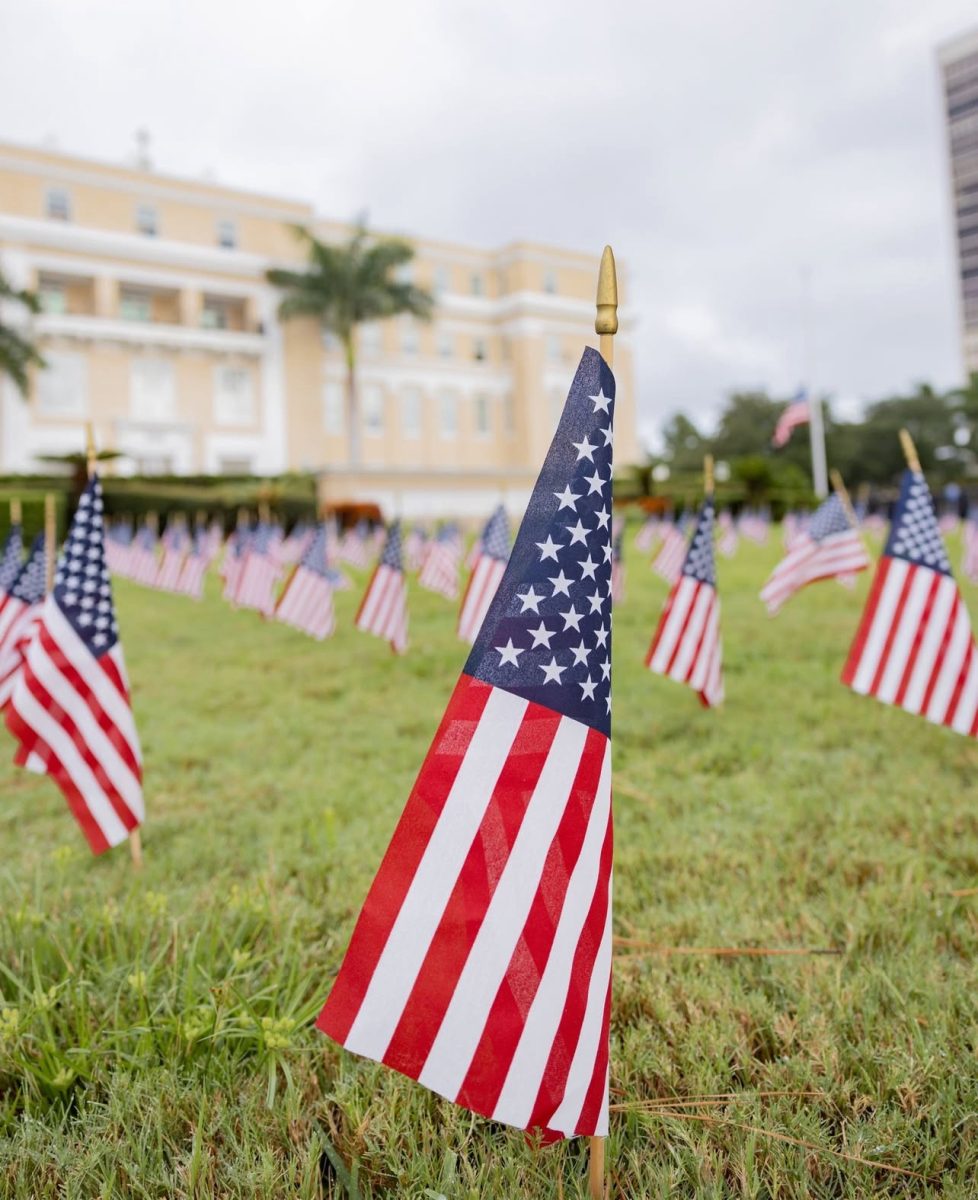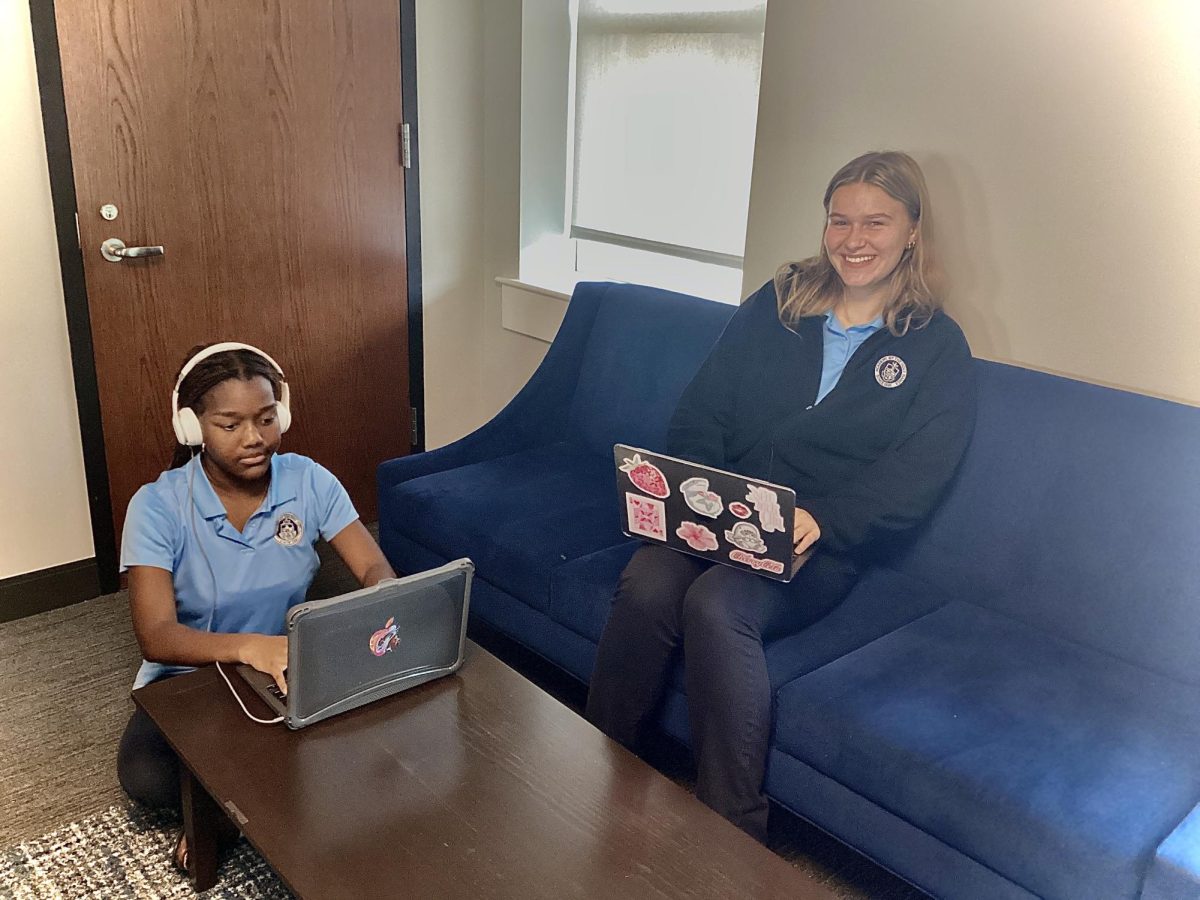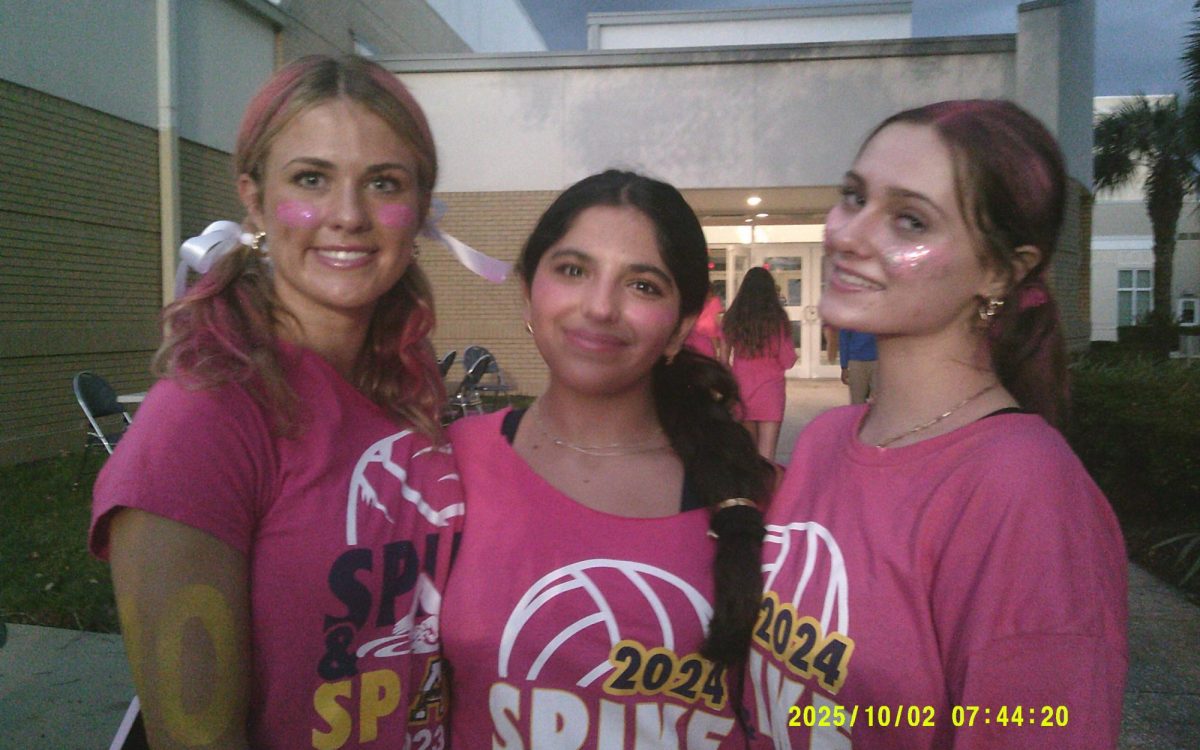Just this fall, Seniors have already begun their college admissions process, with some having already been committed for their sports. This includes the following Seniors: Isabella Dieffenthaller (’25) committed to Brown University for Swimming, Eden Jennings (’25) committed to Florida State University for Swimming, Lena Graham (’25) committed to College of the Holy Cross for Rowing, and Elise McQuiston (’25) committed to University of South Florida for Softball. In the following interview, Co Editor-in-Chief Nicole Bianchi asked a variety of questions to the senior athletes, ranging from their accomplishments to their overall journey towards success.
Background and Early Years
Q: Can you tell us a bit about your background and how you got started into [sport]?
Isabella: Growing up in a swimming family, with my dad and his siblings as collegiate athletes capable of achieving Olympic status, my siblings and I were introduced to the sport at an early age. While many of my siblings and cousins instantly felt at home in the pool and were considered naturally gifted at a young age, that was not the case for me. Despite this, the challenges that I faced only strengthened my determination and perseverance as an athlete and shaped me into the woman that I am today.
Eden: I had tried a few sports when I was younger but nothing that truly sparked my interest. I danced and did ballet for a few years, and I also played lacrosse for a short time. I started swimming when I was 12, joining the Academy at the Lakes varsity high school swim team in 7th grade with some friends. Starting a sport like swimming so late, especially at the varsity level, was a challenge. I knew I had a lot of catching up to do to develop my technique and build up speed. It wasn’t until my freshman year of high school that I started serious year-round “club” swimming at Florida Elite. My sophomore year, I transferred to Academy of the Holy Names and began swimming at Academy Aquatic Club where I continued to push myself and grow as an athlete and as an individual.
Lena: I have grown up playing multiple different sports because my parents wanted us to explore all of our options. I have played probably six or seven sports in my lifetime and when I heard about rowing I thought it could be a cool sport to try out because why not.
Elise: Growing up, I have always been surrounded by sports because of my brothers, so that’s kind of how I got into wanting to do them. I did a variety of sports, including dance, swimming, gymnastics, soccer, volleyball, cross country, and basketball, and even tried out for a baseball team before I got into playing softball. I was always constantly changing the sport I was doing because I never felt like I had a true passion or interest for them. I got started in softball by watching my brothers play baseball, and I knew I wanted to do something similar.
Q: What initially drew you to this sport, and what kept you motivated to continue throughout your journey?
Isabella: The opportunity to spend meaningful and unforgettable time with my friends and family, while bonding over a shared passion, is what initially drew me to the sport of swimming. Being part of the swimming community has also played a significant role in my journey. What keeps me motivated is the inherent challenge of the sport. It has become an addiction; whether it’s a tough practice or a challenging meet, each experience promotes personal growth. Overcoming these challenges feels like a victory in itself, and the endless opportunity for improvement serves as a major motivator both in and out of the pool.
Eden: My older brother’s main sports were basketball and football but he did some high school swimming to build his cardio. I remember going to one or two of his meets, which piqued my interest. When some of my friends chose to join the swim team in 7th grade, I decided to give it a try too. Swimming is a very demanding sport, both physically and mentally, so staying motivated takes a lot of discipline. For me, the drive to improve has always been my biggest motivation. I quickly realized that the effort I put into training determined how much time I would drop. Dropping time was a tangible way to check my progress, which kept me focused. But I also owe so much to my family and friends, who have always supported me. I would not be where I am today without them.
Lena: Freshman year I originally joined just because a lot of my friends were but I was going to only do the fall season and do track in the spring but I ended up falling in love with the sport and stayed both seasons. What I loved was that the sport entailed a technique and a skill that I had never encountered before in any other sport and that kept me hooked.
Elise: I think what drew me to this sport the most was the connection I had with my teammates. I instantly became close and made a lot of friends through playing softball, and even after leaving and moving around teams, I still am really close and hang out with my friends from old teams. I also loved the competitiveness of softball and the concept of teamwork that comes through during games and practices. What kept me motivated was the improvement I saw in myself as I played and practiced more. I was more skilled and advanced quicker in softball than I had playing any other sport in my life, so it made me feel like this was the right sport for me.
Q: At what age did you start thinking seriously about playing sports at the college level? What sparked that desire?
Isabella: Around 8th grade, I started seriously considering a collegiate swimming career, inspired by my older brothers’ impressive scholarship offers and school choices. Despite skepticism from coaches and teammates, who often laughed off my ambitions, I felt a strong determination to prove them wrong. I realized that achieving my goals would require immense resilience and commitment. This motivation drove me to push through challenges, and each difficult practice fueled my ambition, bringing me closer to my goal of competing at the collegiate level.
Eden: I started thinking seriously about collegiate swimming during my 8th grade year, when my friend and mentor McKenna Smith signed to swim for Duke. Her work ethic and drive had always inspired me, and she had always encouraged me to believe in my potential. My mom and I drove up to Durham to watch one of her meets, and seeing her compete and how happy she was there was unforgettable. At first, I doubted whether I would be good enough to compete at that level but with a lot of hard work, it started to become more and more possible. Looking back at my journey, I am so grateful this dream is becoming a reality.
Lena: I don’t think I ever had a desire to be a college athlete growing up
although that always seemed cool. The first time I considered doing it in college was
junior year when my coach came up to me and was like hey lena have you ever
considered doing this in college because you definitely have a chance and I think you
should look into it. That is what sparked my interest.
Elise: I think I always knew I wanted to play in college ever since I started playing travel softball, but I didn’t seriously start considering it until my 8th-grade year. Even at times when I questioned if I really wanted to play in college, I would try to imagine my life after high school not playing softball anymore, and it was something I couldn’t do. I would say just the thought of not playing softball anymore and wanting to play the sport I love for as many years as possible is what sparked my interest in playing in college.
Training and Development
Q: How did you balance school work, family, and athletics during your high school years?
Isabella: My freshman year was my most challenging year of high school as I juggled the intense demands of AP classes, family expectations, and athletic commitments. Each day was a whirlwind of late-night studying and early-morning practices. But through the chaos, I learned the art of effective time management, developing habits that allowed me to balance my academic and athletic responsibilities. More importantly, I learned how to stay focused under pressure, to push through moments of doubt, and to prioritize what truly mattered. Despite the obstacles, that year became a turning point, one that shaped me into the resilient, disciplined, and determined woman I am today. It taught me that growth often comes from the hardest experiences and that perseverance in the face of adversity is key to success.
Eden: Balancing school, family responsibilities, and swim has been one of my most challenging but rewarding parts of my high school career. With morning practices starting at 5:30AM, long school days, coaching young swimmers immediately after school, and then participating in evening practices daily, I had to learn time management very quickly and relied heavily on planning and organization. I leaned a lot on my support system. My family has been so incredibly understanding and encouraging, and made so many sacrifices to help me pursue my goals. It was so important to make sure time with them was a priority, often in family dinners. At school, just making sure all of my class time was being used wisely to stay on top of my assignments. Even though it means missing out on a lot of social events like football games and weekends at the beach with friends, I knew the commitment to swimming would be worth it.
Lena: I honestly work best on a time crunch so I think knowing I would have little time for homework when I got home from practice was helpful because it left little time for me to get side tracked and procrastinate. We had regattas on the weekends and so I would make sure my family came to watch me and in between races I would spend time with them. This sport has definitely been a big time commitment but I learned how to balance all the important people and work in my life because of it.
Elise: Time management was the biggest thing for me and probably for any student-athlete. There were also a lot of sacrifices I had to make, like on the weekends, a lot of my time was dedicated to traveling and playing tournaments so I couldn’t hang out with friends and even during the week with practice It can be hard to balance school work too, but it has taught me how to have good time management and using every my time wisely.
Q: What kind of training regimen did you follow to improve your skills and performance in [sport]?
Isabella: My training schedule is intense and year-round. I wake up at 3:50 AM for two-morning practices each week at 5:00 AM in St. Petersburg. Additionally, I have afternoon sessions five times a week, along with weights and dryland training three times a week. Saturdays are dedicated to a rigorous three-hour practice.
Eden: I train for two hours every afternoon Monday through Friday, plus morning practices Monday, Wednesday, and Friday, for an hour and a half each. On Saturdays, I have a two hour morning practice. Meets are also a regular part of our schedule. Club meets are once a month and last from Friday through Sunday, and Championship meets have prelims and finals and last from Thursday through Sunday. This year, I added strength training to my routine to compliment my work in the pool, which I do three times a week for about an hour and a half.
Lena: We practice Monday-Thursday and Saturday morning, for a total of five times a week for 3 hours each. Practice time with my team is when we typically focus on and practice our technique on the water. I like to use the erg on my own time when I can because I have one at home and that helps me gain the strength I need to apply to my technique and get stronger for college. I had to get a certain erg time on a 2k test in order to row at Holy Cross so I just did the test over and over every few days until I finally hit the time I needed and it felt so good.
Elise: I did a lot of hitting and fielding lessons but also kind of did training on my own at my house through just hitting off a tee and doing defense with my brothers. I also did lots of BP with my dad on the weekends I didn’t have tournaments to improve and stay consistent. Staying consistent through practice helped my skills become muscle memory and it made playing the game a lot easier and I can trust myself more.
Q: Did you have any mentors or role models who helped guide you along the way? How did they influence your career?
Isabella: Some of the most influential mentors in my life are my Dad, my two older brothers, and my club coach, Fred Lewis. Each has played a vital role in motivating me to pursue goals that once seemed unattainable. My family is my strongest support system, always cheering me on in and out of the pool. My dad invested everything into helping me become my best self, and his wisdom continues to inspire me. My older brothers, successful graduates of prestigious universities, serve as constant role models, pushing me to strive for excellence. Coach Fred Lewis has been particularly transformative; he believed in me when my confidence faltered. His encouragement reignited my passion for the sport, for which I will always be grateful.
Eden: I would say a lot of my mentors were people that I have swam with throughout the years that moved on to swim at the collegiate level; I have learned so much from them. McKenna Smith, as I mentioned, gave me so much guidance with swimming and the recruiting process. So many of my coaches have had an incredible impact on my life. Coach Bill Shaffer, Robbie Shaffer, Joe Solak, Chuck Hahn, Ken Weibeck, Guerby Ruuska, and my trainer Roddy Gonzalez have each played unique roles in my development as an athlete and a person. They push me past my limits, teach me discipline, and believe in my potential, even when I doubt it myself. And of course, my biggest supporters and role models have always been my parents. My mom and dad have always encouraged me to shoot for the stars. They made countless sacrifices to support me swimming and have been there to celebrate every milestone and help me through every challenge.
Lena: I would say a role model and someone I looked up to was Teryn Collins, a seniors who graduated last year. We became really close when I earned a spot in the 1v boat my junior year because we sat next to each other in the boat so we would talk a lot in between drills and pieces. She quickly became one of my best friends, the person who would talk me through my 2k test, and the person who encouraged me to reach out to colleges just to keep my opportunities open. Teryn would also hype me back up when needed and she always helped me not to overthink. On my signing day, she actually flew in from George Washington University, where she rows at, to surprise me and support me.
Elise: Yes, I had a lot of mentors and role models who helped me along the way. I say my biggest role models were my parents, who always pushed me to be a better person and a better player. My hitting coach, KK Cenel, is also a role model for me. She’s taught me hitting ever since I started softball and has been a huge help with coaching me and developing me as a player. My travel ball coaches have also been a big help in reaching out to coaches for me and guiding me through the recruiting process.
Recruitment Process
Q: What was your experience with the college recruitment process like? How did you first get noticed by college scouts?
Isabella: My journey with college recruitment began on June 15th, the summer before my junior year of high school, when coaches were officially allowed to start reaching out to prospective recruits. Although the process was often stressful, I am incredibly grateful for the opportunity to be part of it and for the many doors it opened. The experience not only gave me a chance to explore multiple programs but also helped me grow both as an athlete and as a person.
Eden: My experience with college recruiting has been challenging but incredibly rewarding. Starting swimming later than most competitive athletes meant that I didn’t have some of the fast qualifying cuts (times) that others had, so I had to narrow my search down to schools willing to see my potential and invest in me as an athlete. The recruiting process is anything but passive, meaning you have to take the lead. I reached out to coaches at schools I was interested in, introduced myself, and shared my goals and progress. There were weeks that I had six or seven calls with various D1 coaches. It can be overwhelming, but those conversations taught me what I value in a school and program, and ultimately narrowed down my choices. I was also noticed by schools at championship meets which also opened doors. I attended the Florida State Swim Camp last summer which gave me the chance to meet their coaching staff, make an impression, and spark their interest. It genuinely felt like home and I quickly knew I had found the right place for me.
Lena: The recruitment process was fairly simpler for me than for most people because I already had an idea of the school I wanted to row at and that was it. There’s sorta a minimum score you need to start being noticed by coaches and once I got that score the emails from them started rolling in. I would read all of them and hop on calls with as many coaches as I could as to not close myself off but deep down I knew that I really only wanted to go to Holy Cross so I just kept in close contact with that coach constantly sending him emails, videos, and updated scores.
Elise: My process of getting recruited was kinda stressful. A lot of my other softball friends were already getting recruited and I was kind of late in the process of going to camps and getting seen by coaches. I first started getting noticed by coaches through showcase tournaments where they could see me play live games.
Q: What qualities did you look for in a college program? How did you know that a specific school was the right fit for you?
Isabella: My primary focus was finding programs that offered a strong balance between both athletics and academics. I wanted to be part of a program where I could excel in the pool while also receiving a top-tier education. Equally important to me was joining a team that fostered a healthy, positive work ethic—one where both the coaches and athletes are driven, supportive, and committed to continuous growth. Ultimately, I truly believe I couldn’t have found a better place to pursue both my education and athletic career. The program aligns perfectly with my goals, values, and aspirations, and I’m excited to continue my journey at such an amazing institution.
Eden: Going into this process, I knew what I wanted in a school. Staying close to home was important to me, ideally in state, to be closer to my family and because of Florida weather. I knew I wanted to go to a public university because of the cost. I knew that I needed to find a staff who saw my potential and was genuinely invested in helping me grow as a swimmer. Having their support and belief in me was a nonnegotiable. Team culture was also a top priority. Coming from a close-knit, all-girls team, I knew how much a supportive and positive environment could impact my success and overall experience on the team. Academically, I knew I wanted to major in exercise science and kinesiology to prepare me for med school. The school needed to both offer my major and have a strong program surrounded by many internship opportunities. Florida State checked all of these boxes and was genuinely the perfect fit for me.
Lena: Something I was looking for were smaller sized schools because I think I do best in places where I know lots of people and lots of people know me back. I wanted a Jesuit school because the Jesuits are very special to my family considering that my brother is currently in seminary to become one and so that is very comfortable and familiar to me. This narrowed down to my list to a handful of schools and after researching on them I fell in love with Holy Cross. The moment I knew it was the school for me was back in September when I was on my official visit and I walked into the chapel located in the heart of campus. There was the most beautiful loud choir music playing and I was just walking around inside the chapel and I was brought to tears and that’s when I knew that there’s where I belonged and where God was calling me to go.
Elise: I was looking for a college that was close to home because I knew I wanted to stay in Florida, so that was the biggest factor. I also wanted to be a part of a competitive team and be surrounded by players and coaches who would push me to become better. I knew USF was right for me because of how welcoming everyone was. The coaches and athletic staff were all so nice and helpful, and I knew that I wanted to be a part of something similar. Also, the resources that they said I’d be provided when I came to USF were an offer I couldn’t turn down.
Q: How did you navigate the decision-making process when choosing which offers to consider? Were there any tough choices?
Isabella: There were many factors to consider, and it was hard to know which path to take. However, after visiting the schools, connecting with the coaching staff, and speaking with some of the current athletes, everything started to fall into place. I was able to get a real sense of each program’s culture and how I would fit into their vision. Ultimately, it became clear which opportunity aligned best with my goals and values, and I knew I had made the right choice.
Eden: Navigating the decision making process when choosing which offers to consider was definitely challenging. I had a lot of options to start and narrowing them down meant having a set list of qualities I valued most. Official visits were incredibly helpful in this process. They allowed me to experience each school firsthand, meet the teams, and get a feel for what life there would be like. By the end, I had it narrowed down to two schools, both of which aligned perfectly with what I wanted out of my college experience. In the end, I had to go with the school that I believed would challenge me the most and help me grow both as an athlete and a student. It wasn’t easy, but I’m confident that I made the right choice for my future.
Lena: I definitely got a few solid offers but at the end of the day the only school I really desired to go to was Holy Cross so my choice of commitment was very easy and I’m very blessed everything worked out the way it did.
Elise: I navigated my decision process by going and looking at the school I thought I might be interested in. I went to a couple of schools up North because I thought I might want to go to school up there, but I found that I couldn’t see myself leaving Florida when I was up there.
Q: What role did your family play in the decision to pursue college athletics? Did they have any advice or support to offer you during the recruiting process?
Isabella: Yes, I’ve been especially influenced by my dad and older brothers, all of whom competed at the collegiate level in swimming. Their experiences have been invaluable to me, and my older brothers, in particular, have offered a lot of helpful advice, having gone through the recruitment process themselves just a few years before me. Their guidance has been a huge source of support as I navigated my own journey.
Eden: My family played an incredibly supportive role in my decision to swim in college, but they never pushed me in any particular direction. From the very beginning, swimming has always been my choice, and I have never been forced to go to practice or meets. Throughout the recruiting process, my family always gave encouragement and guidance. They were always there to listen, give advance, and help me think through important decisions. Knowing that they would support me no matter what made the process less stressful and allowed me to focus on finding the path that was the best for me. Their unwavering belief in me has been a driving force in my journey.
Lena: My parents were definitely a huge part of my decision to row in college. My dad has told me growing up that idle minds as a result of idle time is not good and that’s something I have always carried with me which definitely played a part in why I decided to play a college sport I knew that I would have a lot of free and unscheduled time in college if I didn’t play a sport and I like a routine schedule that would fill up my time and leave no room for me to mess around. My mom has always been my biggest fan since I started rowing and encouraged me to keep doing what I love in college even if it’ll be hard and even if I am scared. She and one of my uncle actually came with me up on my official visit and saw the school and saw how I fit in there and that gave me the confidence I needed to say yes and pursue the sport further. I have three brothers as well and although they’ll never outwardly say they are proud and support me I know they do because they never wanna miss a chance to watch me race and they proudly wear their Holy Cross merch around! I think my Uncle Jack also influenced my decision because he has expressed interest in my sport and progress since I started and was so exited to fly up and see the school with me. Then when I finally decided to commit he mass ordered a ton of HC purple shirts for my friends and family to wear on my signing day.
Elise: My family played a huge role in helping me get to where I am today. My mom and dad have always been my biggest supporters, and coming from a family of athletes they have had some experience with the recruitment process because of my older brother, who plays baseball in college. My parents would always tell me that everything happens for a reason and to be patient and trust the process.
Commitment and Sacrifices
Q: What were some of the toughest moments during your journey to securing a college spot? How did you push through those difficult times?
Isabella: One of the toughest moments on my journey to securing a college spot was during my freshman-year state competition. I was disqualified in the prelims of one of my key events, which meant I couldn’t compete for a medal or contribute points for my team in the finals. While it was a heartbreaking setback, that experience ultimately shaped me into the stronger athlete I am today. It fueled my determination and became a turning point, motivating me to come back even more focused and driven during my sophomore year.
Eden: One of the toughest challenges I faced was dealing with injuries and physical setbacks. As most people know, I am 6’2½ ”, and growing so quickly caused my bones to grow faster than my ligaments. This caused flexibility issues and coordination problems, which were frustrating to navigate, especially in a technical sport like swimming. I also dealt with a shoulder impingement caused by the high yardage we do at practice. The pain made training even more difficult. Physical therapy was monumental in helping me manage and eventually overcome both of these issues. Another major obstacle was a pinched nerve in my spine, which causes my legs to go numb during certain sets at practice. After much trial and error, we realized that increasing my sodium intake helped reduce these symptoms. So while my height is considered a big advantage athletically, it also came with plenty of obstacles.
Lena: The toughest thing for me was definitely just trying to hit the erg scores I needed to be considered for a spot. I already had the height, personality, and academics needed but I really just needed those erg scores to secure a spot. It required many many 2k tests from freshman to junior year when I finally got it. As easy as 2000 meters on an erg sounds it is actually very difficult both physically and mentally. I had to learn how to put my anxiety aside and just focus on what I could so instead of fearing the outcome. The test require a ot of mental strength to keep going even when your legs are burning and you feel like throwing up and the meters are counting down so slowly so the hardest part for me was definitely learning mental stamina.
Elise: I would say my toughest moments during the recruitment process were staying on top of emails, going to camps, and performing well when I had the opportunity to be in front of a college coach. I was constantly emailing and posting videos of me playing on the internet to try and get seen by coaches, and knowing that there were so many other girls doing the same thing as me and trying to get a spot on a college team just made it even more competitive. I didn’t go to very many camps either, so I had a constant pressure of having to do good at showcases and to stand out whenever I could. Whenever I was stressed out from it all, I would always tell myself that my hard work would pay off in the end and to be patient because the right college for me would come at the right time.
Reflection and Lessons Learned
Q: Looking back, is there anything you wish you had done differently during your athletic journey?
Isabella: No, every experience, challenge, and triumph has shaped me into the strong, resilient woman I am today, and I wouldn’t change a thing. While God may have His own unique way of guiding me, I trust that He always leads me exactly where I need to be, unfolding the best plan for my life in His perfect timing.
Eden: Looking back, I wish I would have started swimming earlier. My mom was adamant about not pushing us into activities and allowing us to choose what we wanted to pursue, so swimming didn’t become an option for me until middle school. I am grateful for her approach because it allowed me to find my own path but it meant that I had a steep learning curve. Playing catch-up has been a challenging process, but I wouldn’t change the lessons I have learned along the way. Starting later taught me so much about myself and gave me drive and resilience, I wouldn’t trade that for the world.
Lena: Honestly there’s nothing I wish I could have done differently. The past four years on this tea have changed my life and taught me so many lessons and perseverance I would have if I hadn’t decided to row. I love my team so so much and the boathouse has honestly become my second home considering I spend over 15 hours a week there. I wish four years hadn’t gone by so fast because I am going to be devastated to leave in a few months but I look forward to meet my new college team.
Elise: At the time, I wish I had figured out what schools I was really interested in and not far-stretch schools; it would’ve made the process a lot easier for me if I had narrowed down schools earlier, to begin with.
Q: What advice would you give to someone just starting the recruiting process for college athletics?
Isabella: Trust the process, even when you don’t understand it. Everything will come together in time, trust me.
Eden: My biggest piece of advice for someone just starting the recruiting process is to be proactive and upfront. Don’t wait for schools to find you, reach out and advocate for yourself. This will show that you are determined and serious about competing at the collegiate level. Don’t get discouraged if things don’t happen immediately or if you face setbacks. Every athlete’s journey is different. Focus on improving yourself, in your sport and as a person, because coaches look for dedication, potential, and work ethic just as much as they look at performance. Trust the process and listen to your instincts. When you find the right school, you’ll feel it. Make sure it’s a place where you can grow as an athlete and as a person, and somewhere you will be supported in reaching your goals.
Lena: Some advice I’d give is to just trust in yourself and trust the process. It doesn’t go by fast and its a lot of work so its important to keep your eyes forward and your final goal of committing to a school in mind when you feel like giving up. I think I would also advise them to put themselves out there and get in contact with numerous different schools because you never know where you’ll end up falling in love with.
Elise: Make sure you have connections either through coaches or any personal trainers to help you get recruited by putting in good words for you; it makes the process a lot easier. Also, having coaches who understand the recruitment process and have experience getting girls recruited can make it more reassuring. Most importantly, I’d say to trust the process; you’ll end up where you’re supposed to be because God always has a plan for you.
Q: Now that you’re committed, what are your goals for your athletic career in college, and how do you plan to achieve them?
Isabella: My primary goal for my athletic career is to reach my full potential, both as an athlete and as an individual. One of my major aspirations is to represent Trinidad & Tobago at the 2028 Olympics in Los Angeles, and I am fully committed to putting in the work to make that dream a reality. Currently, I’m proud to be a member of the Trinidad & Tobago Swimming National Team and hold the national record in the 200 freestyle. Looking ahead, I am eager to continue representing Trinidad & Tobago on the international stage, striving to bring pride to my family’s country with every race. Alongside my athletic pursuits, I recognize the importance of maintaining a balance between athletics and academics. My goal is to excel in both areas, ensuring that I’m thriving as a student while pushing myself to achieve new heights in my sport—without compromising one for the other.
Eden: Now that I’m committed, my goals are not only to contribute athletically but also to be a positive influence on the team’s atmosphere. Academically, I want to succeed and lay a strong foundation for medical school, which is my ultimate goal; but beyond these things, I want to enjoy the experience and forge friendships and memories that will last a lifetime.
Lena: I think one of my goals in college is just making sure I stay true to myself. I think college sports can be a very competitive environment and I want to ensure that I don’t get lost in the work because I think my personality is one of my biggest strengths and I want to bring the joy and support I have on my team now to my next team, I hope to also just continue to learn discipline and hard work through the rigor between college classes and practices because those are skills that’ll last me forever.
Elise: I’m looking forward to having a set group of friends and a team I can rely on as soon as I step on campus. One of the great things about being a college athlete is that I’ll always have a group of girls that I can ask for help as I navigate through college. My goal is to have as much fun as possible and push myself knowing I’m going to be surrounded by a bunch of talented players.
Q: What does success look like to you, both as an athlete and as a person, in the coming years?
Isabella: Success to me comes from embracing continuous learning, challenging myself to step outside my comfort zone, and cultivating qualities like empathy, patience, and self-discipline. It’s about growing not just in skill but in character—becoming a better version of myself with every experience. True success is finding peace in who I am while striving to grow into the person I’m called to be.
Eden: Success to me, both as an athlete as a person, goes beyond winning. It’s about growth, dedication, and making a positive impact. As an athlete, success means pushing myself to reach my full potential, whether that’s improving my times, contributing to my team’s success, or overcoming challenges thrown my way. As a person, success looks like growing into someone who is confident, compassionate, and grounded. I want to forge friendships and contribute to my community while staying true to my values. Success isn’t about reaching a specific goal, it’s about the journey, the lessons learned, and the person I become. I will leave college “successful” if I look back and feel proud of the effort put in, the growth I experienced, and the impact I had on those around me.
Lena: Success to me looks like effort and taking steps in the right direction. I think something that has been difficult to come to terms with is the fact that your not always going to be the best especially on a team with such talented athletes so you cant define success in regards to other people. Success to me means putting in the work to get better and making progress even if its slowly and not getting discouraged because it is definitely going to be hard transitioning from being top of the totem pole as a senior to going back down to being a freshman on the team next year.
Elise: Success to me is hard work that has finally paid off. The most successful people in the world are the ones who work the hardest and do it every day to achieve their goals. My dad would always tell me that “if it was easy, then everybody would do it,” which is something that always stuck with me because it taught me that nothing in life is handed to you and you have to work for the things you want to see the best results.









